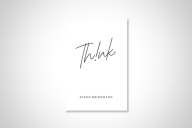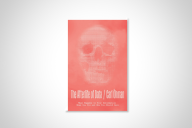You have /5 articles left.
Sign up for a free account or log in.
The billboard shows a sleek new automobile, the price tag no doubt considerable, though nowhere in sight. Instead, the agency that created the ad has run a single line of text with the image. It isn’t just a catchphrase; it’s a grab at profundity. “A strong want,” the new Lexus motto proclaims, “is a justifiable need.”
The first time I saw the ad, my jaw dropped. Now it just clenches in disgust. (If absolute moral stupidity ever required a slogan, then “A strong want is a justifiable need” would do the trick.) And once the irritation is past, there is the realization that Philip Rieff was probably right when he speculated that a new character had arrived on the scene in Western culture: “psychological man.”
Rieff, who died on July 1, was for decades a somewhat legendary professor of sociology at the University of Pennsylvania. To echo a point made elsewhere, I think the power of his influence greatly exceeded the reach of his reputation. Rieff didn’t want a large readership. He wrote in knotty apothegms -- developing a set of terms that resembled sociological jargon less than it does the private language of some brilliant but eccentric rabbi. With his later texts (including My Life Among the Deathworks, just published by the University of Virginia Press) you do not so much read Rieff as sit at his feet.
But in his first book, Freud: The Mind of the Moralist (1959) -- his dissertation from the University of Chicago, as rewritten with the help of his first wife, Susan Sontag -- the knack for aphorisms had not yet hardened into a tic. He was still addressing a broad audience of educated readers, not disciples. And it was in the final pages of that volume that he sketched the concept of “psychological man.”
According to Rieff’s careful reading, the founder of psychoanalysis was no subversive champion of the id against bourgeois society. Rather, his Freud comes to resemble other Victorian sages who tried to create inner order as the established patterns of authority were dissolving. But along the way, Freud also helped foster a new system of values – one toward which Rieff would show deep and growing ambivalence.
The new “character ideal” that Rieff saw emerging in Freud’s wake was no longer inspired by religious faith, or a strong sense of civic responsibility. Psychological man would not even need to cultivate the sort of self-interested self control practiced by his immediate ancestor, homo economicus. (Think of Benjamin Franklin, making himself wealthy and wise by careful planning.) Psychological man need not fret over material security – being, after all, reasonably comfortable in an affluent society. His energies would turn inward, toward the care and maintenance of the self.
Rieff returned to the future of psychological man in his second book, The Triumph of the Therapeutic. Its final sentence verges on a prophetic statement, then carefully backs away:
“That a sense of well-being has become the end, rather than the by-product of striving after some communal end,” wrote Rieff, “announces a fundamental change in the entire cast of our culture – toward a human condition about which there will be nothing further to say in terms of the old style of hope and despair.”
It can be strange to read some of the earliest discussions of Rieff’s work, for there was occasionally a tendency to regard him as cheerleading “the triumph of the therapeutic.” This was wide of the mark. Eventually Rieff did find things to say about this cultural transformation “in the old style of despair.”
He became a cultural reactionary. I mean that term as a description, rather than a denunciation. He saw culture as a system of restraints (what he termed “interdicts”) that prevented the individual from being swamped by the excessive range of potential human desires and behaviors. Thrown into “the abyss of possibility,” man “becomes not human but demonic.” So Rieff put it in reviewing Hannah Arendt’s The Origins of Totalitarianism.
As the historian Christopher Lasch once put it, Rieff belonged to “the party of the superego.” (Lasch translated many of Rieff’s insights about psychological man into a neo-Marxist analysis of the “culture of narcissism” emerging in advanced capitalist society.) And it was the duty of any teacher worthy of the name to play the role of superego to the hilt. “Authority untaught,” Rieff declared in the early 1970s, “is the condition in which a culture commits suicide.”
His later writings are, in effect, a series of coroner’s reports. “We professionals of the reading discipline,” he stated in My Life Among the Deathworks, “we are the real police. As teaching agents of sacred order, and inescapably within it, the moral demands we must teach, if we are teachers, are those eternal truths by which all social orders endure.” And Rieff made it pretty clear that he did not think this was happening.
There are plenty of conservative publicists in America now. There are not many conservative thinkers, proper, worthy of the name. Rieff, for all his crotchety obliqueness, was one of them.(By the way, the ratio of philosophers to propagandists is hardly any better on the left.)
In scrutinizing the logic of contemporary culture, Rieff indirectly revealed some of the dark secrets of U.S. politics -- which has been dominated by the right wing for at least a quarter century now. The therapeutic has triumphed in the red states as well as the blue. Any reference to how Ronald Reagan and George W. Bush proved themselves as great leaders by “helping America feel good about itself” confirms that psychological man is often happy to vote Republican.
But more than that, Rieff is of lasting interest for upholding an exorbitant standard of seriousness. The Feeling Intellect, a collection of his essays published by the University of Chicago Press in 1990, is rather awe-inspiring in the range and intensity of its erudition – though you do have to look past the strangely cultish introduction by one of the author’s devotees, Jonathan B. Imber, a professor of sociology at Wellesley College.
And his early polemic in the culture wars, Fellow Teachers, is some kind of cranky masterpiece. (It is now out of print.) One passage in particular has left a strong impression, lingering in my mind like the voice of a testy grandfather telling me to get off the Internet.
“Our sacred world must remain the book,” he says. “No, not the book: the page.... To get inside a page of Haydn, of Freud, of Weber, of James: only so can our students be possessed by an idea of what it means to study.... Then, at least, they may acquire a becoming modesty about becoming ‘problem-solvers,’ dictating reality. Such disciplines would teach us, as teachers, that it would be better to spend three days imprisoned by a sentence than any length of time handing over ready-made ideas.”
Reading this again, I feel guilty of a thousand sins. Which is, of course, the intent. There are qualities and opinions in Rieff’s work it is difficult to admire. But studying him has at least one good effect. It teaches you to think about the difference between a strong want and a justifiable need -- and to keep a safe distance from anything tending to blur that distinction.








